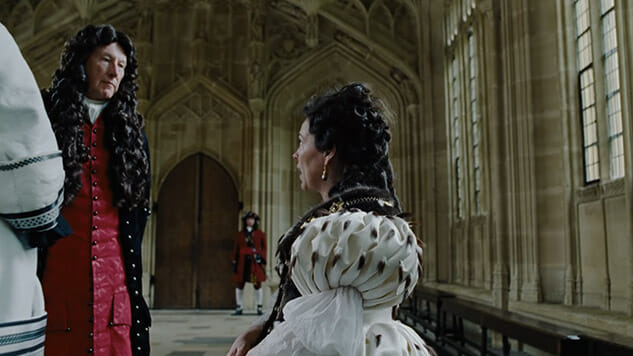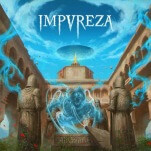The Favourite

Love is a battlefield, as Pat Benatar once opined—a cliche usually used to illustrate the ways in which battered hearts are freely stacked like victims in an emotionally precarious game of Jenga, but one that can also convey how love and sex, though not necessarily mutually inclusive, are never neutral. Those acts and feelings are political. A kiss is never just a kiss, and in Yorgos Lanthimos’s The Favourite, massaging someone’s leg, one person standing and the other on their knees, is not just a massage. It’s a gambit, its stakes suggesting that the personal and the political are inextricable from one another.
From a fiendishly barbed screenplay by Deborah Davis and Tony McNamara (this is the first film of Lanthimos’s not co-written by him), The Favourite is about ailing, naïve, fussy Queen Anne (Olivia Colman)—ruler of Great Britain from 1702 to 1707—who acts like a wanton child (or is she treated like a child?) and submits most of her power and leadership duties to her “favourite,” Lady Sarah Churchill, Duchess of Marlborough (Rachel Weisz). This is convenient for Lady Sarah, who uses this opportunity for political strategy, swaying the Queen’s Tory-like politics to her own Whiggian politics, despite the battles she must carry on in court regularly (particularly against Robert Harley, a Tory, played by Nicholas Hoult). Her role as the Queen’s right-hand woman is as emotionally exhausting as it is politically fulfilling; while pushing for higher land taxes in order to finance an ongoing war with France, she is expected to quell the Queen’s many insecurities and neuroses. When Sarah’s distant cousin, and former lady herself, Abigail Hill (Emma Stone) lands on the steps of the palace, Abigail realizes she, too, can strategize to climb her way back to the top, even if it means pushing Sarah aside at all costs.
For Abigail, observant and gifted with a sardonicism weaponized as a survival tactic, that means mirroring Sarah, or what Sarah “should” be doing on a personal level with the Queen. Where Sarah is harsh, unapologetic and acidic in her evaluations of the Queen (Sarah tells her that she looks like a badger at one point), Abigail becomes soft, angelic and tender. She shapeshifts into a suck-up. Offered the opportunity by Harley to ascend the court in other ways, she eschews this, her slyness a necessary asset for self-preservation, versatile in her ability to use other people (including men) as pawns.
Sarah, not infrequently regaled in costumery that suggests androgyny (juxtaposed against the more explicit femininity of Abigail’s wardrobe), is hard handed with Queen Anne because she needs to be, she might tell herself. Someone has to run things around here. Sarah’s backhanded compliments to and negging of the Queen shake the oft wheelchair bound crown wearer. But it is worth it, perhaps, for the Queen when Sarah sheds her armor and reveals her more amorous side. They exchange declarations of love and some amorphous form of commitment, but Sarah is more reticent, always including her love for the country in these discussions. The Queen frowns, understandably.
-

-

-

-

-

-

-

-

-

-

-

-

-

-

-

-

-

-

-

-

-

-

-

-

-

-

-

-

-

-

-

-

-

-

-

-

-

-

-

-








































